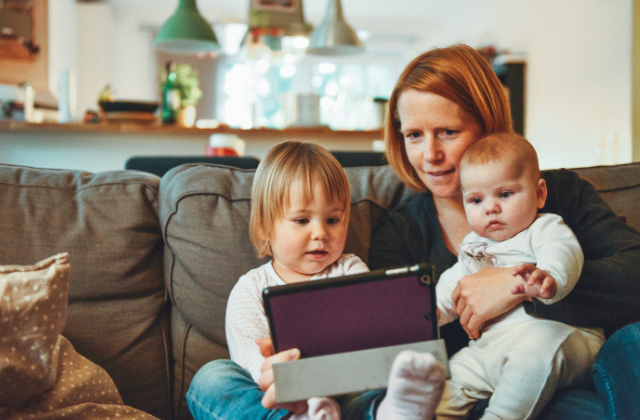12 May 2021
The pandemic has changed our working routines and rhythms. But it’s also pushed us to look at ourselves more, understanding our daily challenges and strengths. It’s pushed us to reflect on the socio-cultural changes that are happening around us. When we look at the challenges that working mothers have faced over this time, society can learn what needs to change to evolve and adapt to the people that we’ve become.
This is just one of the points that emerged from the virtual Life Ready Conference 2021 organized by Lifeed in partnership with Il Sole 24 Ore and AlleyOop, moderated by Lifeed CEO Riccarda Zezza. Six managers who are also mothers took part in the panel.
Starting with the Lifeed survey results, we started discussing the question: “How have working mothers reacted to the pandemic?”. The data painted a picture of mothers that have become stronger through the experience. After all, mothers are used to facing transitions throughout their personal life. Riccarda Zezza highlighted that “this period of pandemic has revealed the natural leadership skills that mothers have”.
When asked “Has this transition improved your leadership skills?” addressed to new parents, 71% of the participants answered yes. In particular, in mothers the perception of improving their leadership skills through their care roles is higher (74%) and in new mothers it reaches 79%.
As the whole world is going through a phase of transition, women’s change management skills have been incredibly useful for the business world. We now need to change the cultural and social paradigms: giving women a better representation in management roles to truly change the world of work.
Our centre of gravity has shifted to focus on relationships. Shared responsibilities are perceived differently, according to Giovanna Della Posta CEO at Invimit: “I’m a working mother, but I prefer to say we’re a family that works. When we move the family’s centre of gravity, the mother’s ability to react becomes the family’s ability to react”. A change that can come through working on how aware we are of new milestones. “We can change this world by putting women in the driving seat to change these processes. It’s our job to change the culture, taking a step forward each day”.
Maria Laura Garofalo CEO at Garofaolo Health Care believes that women have the advantage in the pandemic. They’ve been able to react to uncertainty with “greater certainty, courage, sacrifice and empathy, in a practical and transferable way”. Attitudes that are needed to change the world of work, as well as building a more efficient and productive country. A system that excludes women from high levels of management and that doesn’t value them based on their professional worth. Real change can only happen “through greater awareness and sharing cultural points of view, as well as a system that honours people based on their merits”.
Teams are built on shared objectives and needs. Only those that are on the team can really make a difference to the culture, that “requires everyone to contribute – even those who are most privileged”, says Angela Paparone HR Lead Italia at Microsoft. An opportunity to become a positive role model for women, but most importantly to be there. “When we’re there, we need to have the courage to say hard things”. An active presence can generate change. “We need to be strong and aware of what we can contribute. We need to give a voice to new ways of working that can help women through their complexities”. Social responsibility that drives change.

A social, political and cultural change to drive our economies in a new direction. That’s why Francesca Polti, General Director at Polti Group has invited entrepreneurs to re-evaluate their human resources “because teams must be seen as true resources to bring variety to the company and understand the skills that working mothers can bring to the workplace”. It’s about rethinking our working and family models, “educating both genders” on positive models of shared responsibilities. As Francesca says, “we need to speak directly to the dads out there”.
Polti then asked mothers to believe in themselves more, expressing their abilities at home and at work. “Don’t be scared to show off your skills and let them be recognized”. According to Polti, we need to focus on anti-fragility, or rather the “ability to grow, improve and strengthen ourselves, not being afraid of change but learning to manage it, seeing risks as opportunities”.
Working to break down stereotypes is something that’s familiar to Luisa Todini, President at Comitato Leonardo and Green Arrow Capital. She underlined the importance of teaming up with other women to share in the same experiences. “Being a working mother is like a master’s and a PhD rolled into one. No academic training can teach us and leave a positive trace like being a mother can”.
The pandemic has been a sort of stress test for all. Women, above all working mothers, “have reacted with strength, revealing a natural disposition to face the changes that are born out of transitions”. As we gradually return to some form of normality, we’ll need “suitable structural tools that focus on long-term planning and less bureaucracy”.
The need to multitask means sharing tasks with our partners, as well as being patient with our family rhythms. But it also means managing our working time differently. For Laura Villani Managing Director and Partner at Boston Consulting Group, the pandemic represents a social watershed that “even in difficult times, it’s bought positive elements to the table and has confirmed how reactive women are”, when facing emergencies. Finally, Villani believes that we need to see time as being valuable: “I’d like to see a world that values time more, a world that gives everyone the opportunity to be a leader. A world that recognizes that everyone has something good to offer to the world that surrounds them”.